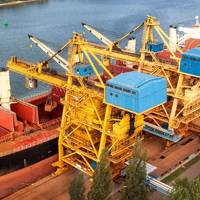Bulkers to Benefit as China Iron Ore Appetite Grows

It has been quite awhile since the global bulk carrier market has had much to cheer about, but U.S. dry bulk shippers are set to post strong revenue growth in the next two years thanks to soaring Chinese demand for high-grade iron ore from Brazil and Australia. To combat severe winter smog, China has slashed iron ore output, pushing steel mills in the world's second biggest economy to import more high-grade ore. China also wants to make pollution control a priority for the next three years.
Vale's Tubarao Port to be Reopened
Brazilian mining company Vale SA may reopen its iron ore and coal port, Port of Tubarao, near Vitoria, reports Reuters. Vale, the world's largest iron ore exporter, said the order came from Brazil's Federal Regional Tribunal. The injunction gave Vale, the world's largest iron ore exporter, 60 days to fix water and air pollution issues or face reclosure of the facility, said the lawyer, Sergio Bermudes, of Sergio Bermudes Advogados. The Tubarao port operations have been suspended due to environmental issues, notably the dust that was spreading to neighbouring areas. Tubarao is extremely important for Vale, as Vale exports more than 1/3 of its iron ore production through this port. During the first 9 months of 2015, Vale exported 82.5 million tonnes of iron ore through Tubarao.
Brazilian Soybeans Sold to China Bound for US
Two Brazilian soybean cargoes sold by Japan's Marubeni Corp that were initially sold to China have been switched to the United States, according to port and shipping data updated on Tuesday, the latest of several U.S. import shipments expected this season. The vessels containing a total of 125,000 tonnes of the oilseed are scheduled to reach the United States next month. Importers in China, the world's top soybean buyer, have already defaulted on at least 500,000 tonnes of U.S. and Brazilian soybean cargoes worth around $300 million amid slowing demand and tightening credit in China. At least one of the cargoes was sold by Marubeni. Some cargoes initially purchased by Chinese importers have found new destinations in the United States and Europe.






